adventure Sites
-
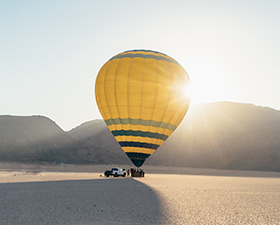
Wadi Rum
-
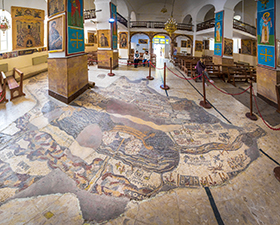
Madaba
-
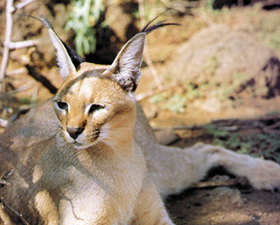
Dana & Feynan
-

Aqaba
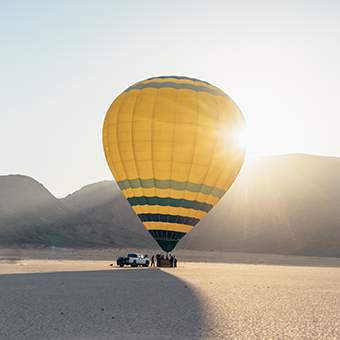
Wadi Rum
A maze of monolithic rockscapes rises up from the desert floor to heights of 1,750m, creating a natural challenge for serious mountaineers. Hikers can enjoy the tranquility of the boundless empty spaces and explore canyons to discover 4000-year-old rock drawings and the many other spectacular treasures this vast wilderness holds in store. There are several options for exploring Wadi Rum. Visitors should head to the Visitors Centre where, apart from visitors’ facilities, they can hire a 4x4 vehicle, together with driver/guide, and then drive for two or three hours into the protected area to explore some of the best known sites. Alternatively, they can hire a camel and guide. The duration of the trip can be arranged beforehand through the Visitors Centre, as can a stay under the stars in a Bedouin tent, where you can enjoy a traditional campfire meal accompanied by Arabic music.
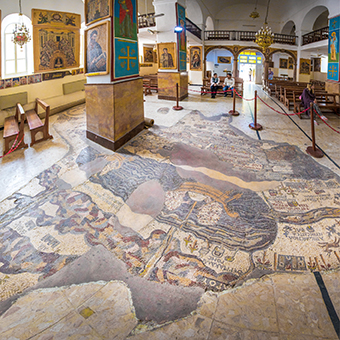
Madaba
Madaba is a combination of rural home life and a hot spot for religious tourism. Known as the “City of Mosaics”, Madaba is the cultural epicenter for Byzantine and Umayyad mosaics. Just a short distance from the capital, visitors are just a stone's throw away from the holy monuments of religious iconography.
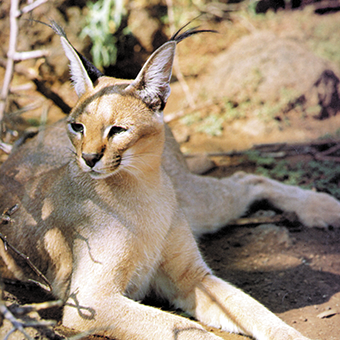
Dana & Feynan
Dana is an unparalleled haven of peace and tranquility, and an extraordinary world of natural treasures. It is an experience that defines the meaning of the phrase “going back to nature.” The Dana Biosphere Reserve has been identified by Birdlife International as an Important Bird Area (IBA). Here you can meditate amid the quiet stillness of the mountains, sleep under the stars, enjoy fresh air and cooling breezes, or track the footprints of the marvelous wildlife endemic to this terrain. There is a whole wilderness to explore and a variety of flora and fauna to be discovered. Moreover, visitors have the opportunity to meet and get to know the native people of Dana; the kind and hospitable Ata’ta tribe, who have made this their home for the past 400 years, continuing the tradition of settlement in the area that began more than 6,000 years ago.

Aqaba
The Gulf of Aqaba is famous for its marine wildlife. It is the north-eastern arm of the Red Sea, measuring a length of 180km and expanding to a width of 25km, with a shoreline shared by Egypt, Saudi Arabia, Israel, and Jordan. The Gulf of Aqaba has the world’s northernmost coral reef ecosystem. An average water temperature of °23 Celsius, the absence of stormy weather, and mild water currents have created a hospitable environment for the growth of corals. Favorable salinity levels are perfect for the myriads of other marine life-forms. As a result, it is home to 110 species of soft corals and 120 species of hard corals. The reefs that fringe the Gulf host over 1,000 species of fish, corals, crustaceans, and mammals living in its waters. Nocturnal animals such as the crab, shrimp, and lobster appear in search of food in the dark hours of the night. Seasonal visitors to the Gulf of Aqaba include sea turtles, dolphins, sea cows, and harmless whale sharks.
Discover more
Stargazing in Jordan
Under Jordan’s vast desert skies, stargazing offers an awe-inspiring experience with some of the clearest views of constellations, planets, and the Milky Way. Wadi Rum, known for its pristine, light-pollution-free environment, provides a perfect setting for observing the cosmos. Guided by local Bedouins, visitors can connect ancient stories to the stars while immersing themselves in the desert's tranquil beauty. Additionally, the Dana Biosphere Reserve, with its elevated landscapes and remote location, offers excellent stargazing conditions, where meteor showers and deep-sky objects come into view. Whether through an overnight camp or a telescope-guided tour, Jordan’s desert and wilderness promise an unforgettable cosmic journey.

Bird Watching in Jordan
Jordan is an exceptional destination for birdwatching enthusiasts, positioned at the crossroads of Europe, Asia, and Africa. This unique location makes it a crucial migratory corridor, attracting bird species from various regions. With 436 recorded species, Jordan’s diverse landscapes provide unparalleled opportunities to observe rare and migratory birds in their natural habitats. The Azraq Wetland Reserve serves as a vital stopover for herons, eagles, and the elusive hoopoe lark, while the Dana Biosphere Reserve offers breathtaking views of griffon vultures soaring above rugged cliffs. Whether exploring the lush forests of Ajloun or the serene waters of Aqaba, Jordan’s rich biodiversity makes it a hidden gem for birdwatchers.
-
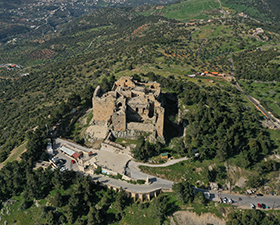
Ajloun
-
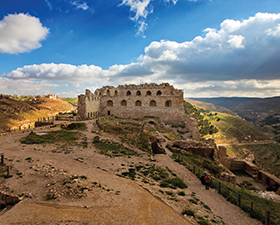
Karak
-
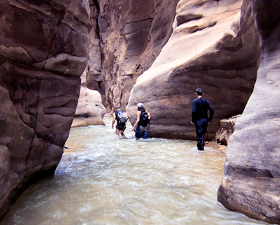
Wadi Mujib
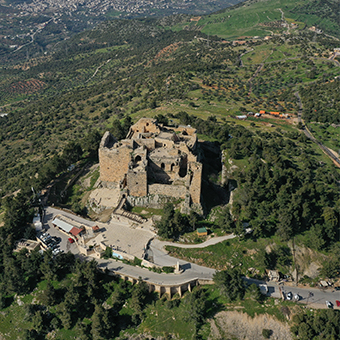
Ajloun
The marvels of nature and the genius of medieval Arab military architecture have given northern Jordan two of the most important ecological and historical attractions in the Middle East: the sprawling pine forests of the Ajlun-Dibbine area, and the towering Ayyubid castle at Ajloun, which helped to defeat the Crusaders eight centuries ago. Locals often take advantage of the green landscapes of Ajloun to take a break from city life and connect with nature.
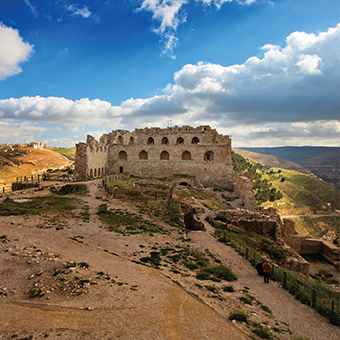
Karak
Whether you approach Kerak from the ancient Kings Highway to the east, or from the Dead Sea to the west, the striking silhouette of this fortified town and castle will instantly make you understand why the fates of kings and nations were decided here for millennia.
An ancient Crusader stronghold, Kerak sits 900m above sea level and lies inside the walls of the old city. The city today is home to around 170,000 people and continues to boast a number of restored 19th century Ottoman buildings, restaurants, places to stay, and the like. But it is undoubtedly the Kerak Castle that dominates.
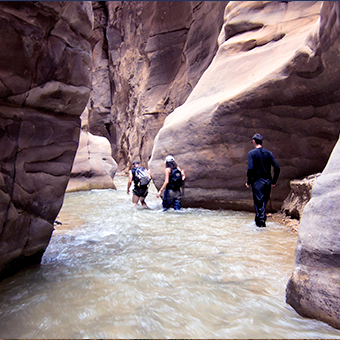
Wadi Mujib
The Mujib Biosphere Reserve is the lowest nature reserve in the world, with a spectacular array of scenery near the east coast of the Dead Sea. The Reserve is located within the deep Wadi Mujib gorge, which enters the Dead Sea at 410m below sea level. The Reserve extends to the Kerak and Madaba mountains to the north and south, reaching 900 metres above sea level in some places. This 1,300m variation in elevation, combined with the valley's year-round water flow from seven tributaries, means that Wadi Mujib enjoys a magnificent bio-diversity that is still being explored and documented today. Over 300 species of plants, 10 species of carnivores, and numerous species of permanent and migratory birds have been recorded. Some of the remote mountain and valley areas are difficult to reach, and thus offer safe havens for rare species of cats, goats and other mountain animals. Mujib's sandstone cliffs are an ideal habitat for one of the most beautiful mountain goats in the world, the horned Ibex. Note: Wadi Mujib and canyons all around the Kingdom are closed during the winter months.

Stargazing in Jordan
Under Jordan’s vast desert skies, stargazing offers an awe-inspiring experience with some of the clearest views of constellations, planets, and the Milky Way. Wadi Rum, known for its pristine, light-pollution-free environment, provides a perfect setting for observing the cosmos. Guided by local Bedouins, visitors can connect ancient stories to the stars while immersing themselves in the desert's tranquil beauty. Additionally, the Dana Biosphere Reserve, with its elevated landscapes and remote location, offers excellent stargazing conditions, where meteor showers and deep-sky objects come into view. Whether through an overnight camp or a telescope-guided tour, Jordan’s desert and wilderness promise an unforgettable cosmic journey.

Bird Watching in Jordan
Jordan is an exceptional destination for birdwatching enthusiasts, positioned at the crossroads of Europe, Asia, and Africa. This unique location makes it a crucial migratory corridor, attracting bird species from various regions. With 436 recorded species, Jordan’s diverse landscapes provide unparalleled opportunities to observe rare and migratory birds in their natural habitats. The Azraq Wetland Reserve serves as a vital stopover for herons, eagles, and the elusive hoopoe lark, while the Dana Biosphere Reserve offers breathtaking views of griffon vultures soaring above rugged cliffs. Whether exploring the lush forests of Ajloun or the serene waters of Aqaba, Jordan’s rich biodiversity makes it a hidden gem for birdwatchers.

